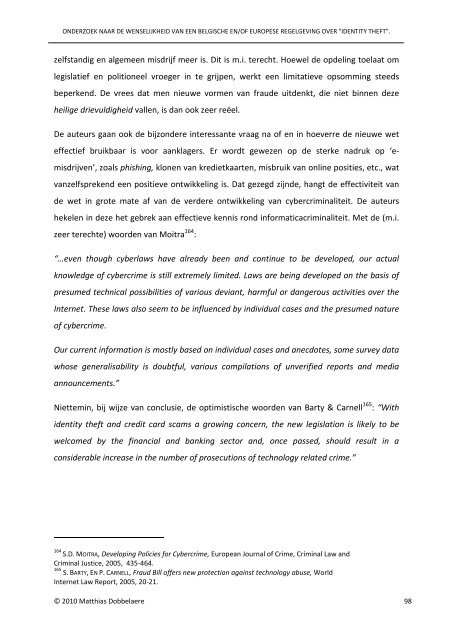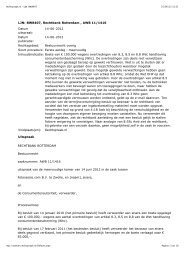Identity theft in de ICT - Mylex
Identity theft in de ICT - Mylex
Identity theft in de ICT - Mylex
Create successful ePaper yourself
Turn your PDF publications into a flip-book with our unique Google optimized e-Paper software.
ONDERZOEK NAAR DE WENSELIJKHEID VAN EEN BELGISCHE EN/OF EUROPESE REGELGEVING OVER "IDENTITY THEFT”.<br />
zelfstandig en algemeen misdrijf meer is. Dit is m.i. terecht. Hoewel <strong>de</strong> op<strong>de</strong>l<strong>in</strong>g toelaat om<br />
legislatief en politioneel vroeger <strong>in</strong> te grijpen, werkt een limitatieve opsomm<strong>in</strong>g steeds<br />
beperkend. De vrees dat men nieuwe vormen van frau<strong>de</strong> uit<strong>de</strong>nkt, die niet b<strong>in</strong>nen <strong>de</strong>ze<br />
heilige drievuldigheid vallen, is dan ook zeer reëel.<br />
De auteurs gaan ook <strong>de</strong> bijzon<strong>de</strong>re <strong>in</strong>teressante vraag na of en <strong>in</strong> hoeverre <strong>de</strong> nieuwe wet<br />
effectief bruikbaar is voor aanklagers. Er wordt gewezen op <strong>de</strong> sterke nadruk op ‘e-<br />
misdrijven’, zoals phish<strong>in</strong>g, klonen van kredietkaarten, misbruik van onl<strong>in</strong>e posities, etc., wat<br />
vanzelfsprekend een positieve ontwikkel<strong>in</strong>g is. Dat gezegd zijn<strong>de</strong>, hangt <strong>de</strong> effectiviteit van<br />
<strong>de</strong> wet <strong>in</strong> grote mate af van <strong>de</strong> ver<strong>de</strong>re ontwikkel<strong>in</strong>g van cybercrim<strong>in</strong>aliteit. De auteurs<br />
hekelen <strong>in</strong> <strong>de</strong>ze het gebrek aan effectieve kennis rond <strong>in</strong>formaticacrim<strong>in</strong>aliteit. Met <strong>de</strong> (m.i.<br />
zeer terechte) woor<strong>de</strong>n van Moitra 164 :<br />
“…even though cyberlaws have already been and cont<strong>in</strong>ue to be <strong>de</strong>veloped, our actual<br />
knowledge of cybercrime is still extremely limited. Laws are be<strong>in</strong>g <strong>de</strong>veloped on the basis of<br />
presumed technical possibilities of various <strong>de</strong>viant, harmful or dangerous activities over the<br />
Internet. These laws also seem to be <strong>in</strong>fluenced by <strong>in</strong>dividual cases and the presumed nature<br />
of cybercrime.<br />
Our current <strong>in</strong>formation is mostly based on <strong>in</strong>dividual cases and anecdotes, some survey data<br />
whose generalisability is doubtful, various compilations of unverified reports and media<br />
announcements.”<br />
Niettem<strong>in</strong>, bij wijze van conclusie, <strong>de</strong> optimistische woor<strong>de</strong>n van Barty & Carnell 165 : “With<br />
i<strong>de</strong>ntity <strong>theft</strong> and credit card scams a grow<strong>in</strong>g concern, the new legislation is likely to be<br />
welcomed by the f<strong>in</strong>ancial and bank<strong>in</strong>g sector and, once passed, should result <strong>in</strong> a<br />
consi<strong>de</strong>rable <strong>in</strong>crease <strong>in</strong> the number of prosecutions of technology related crime.”<br />
164<br />
S.D. MOITRA, Develop<strong>in</strong>g Policies for Cybercrime, European Journal of Crime, Crim<strong>in</strong>al Law and<br />
Crim<strong>in</strong>al Justice, 2005, 435-464.<br />
165<br />
S. BARTY, EN P. CARNELL, Fraud Bill offers new protection aga<strong>in</strong>st technology abuse, World<br />
Internet Law Report, 2005, 20-21.<br />
© 2010 Matthias Dobbelaere 98



